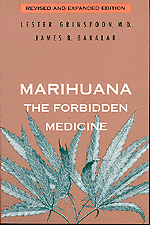
- CANCER CHEMOTHERAPY (FROM DR. GRINSPOON)
- OSTEOARTHRITIS
- PREMENSTRUAL SYNDROME
- BIPOLAR OR MANIC-DEPRESSIVE DISORDER
- PSEUDOTUMOR CEREBRI
- DIABETIC GASTROPARESIS
- MARIJUANA AND AGING
Early in 1972, after the death of Sidney Farber, the Harvard children’s oncologist for whom the Sidney Farber Cancer Research Center was named, my wife and I were invited to dinner at the home of a fellow Harvard Medical School faculty member. He wanted me to meet Emil Frei, who had arrived from Houston to serve as Dr. Farber’s successor.
At dinner, Dr. Frei told me about an eighteen-year-old Houston man with leukemia who had become more and more resistant to cancer chemotherapy because he could no longer tolerate the nausea and vomiting. His doctors and his family were finding it increasingly difficult to persuade him to take the drug on which his life depended.
One day, to Dr. Frei’s surprise, the young man willingly agreed to take the drug and from then on offered no resistance to chemotherapy. He eventually revealed that he had been smoking marijuana twenty minutes before each session; it prevented all vomiting and even the slightest hint of nausea. Dr. Frei asked me whether this property was mentioned in the nineteenth-century medical literature on cannabis, and I told him that it was. On the way home my wife Betsy, who had listened with great interest, suggested that we obtain some cannabis for our son Danny.
Danny was first given the diagnosis of acute lymphatic leukemia in July 1967; he was ten years old. For the first few years he was good natured about his treatment at Children’s Hospital in Boston, and even about the occasional need for hospitalization. But in 1971 he started taking the first of the drugs that cause severe nausea and vomiting.
Danny was one of those patients in whom these reactions were uncontrollable and not sufficiently alleviated by standard antiemetics. He would start to vomit shortly after treatment and continue retching for up to eight hours. He vomited in the car as we drove home, and on arriving he had to lie in bed with his head over a bucket on the floor. Still, I was shocked when Betsy suggested that we find cannabis for Danny. I objected because it was against the law and because it might embarrass staff members at the hospital, who had been so remarkable in their commitment to Danny’s care. I dismissed the idea.
Danny’s next treatment was two weeks later. When I arrived, Betsy and Danny were already in the treatment room. I shall never forget my surprise. Normally my wife and son were in a state of great anxiety before the treatment began, but this time they were completely relaxed, and, what is more, seemed almost to be playing a joke on me.
Finally they let me in on the secret. On the way to the clinic that morning they had stopped near Wellesley High School, and Betsy had asked one of Danny’s friends to get her some marijuana. Once he recovered from his disbelief, the friend had run off and reappeared a few minutes later with a small amount of marijuana. Betsy and Danny had smoked it in the parking lot of the hospital just before entering the clinic.
My surprise gave way to relief as I saw how comfortable Danny was. He did not protest as he was given the medicine, and we were all delighted when no nausea or vomiting followed. On the way home he asked his mother if he could stop for a submarine sandwich, and when he got home he began his usual activities instead of going straight to bed. We could scarcely believe it.
The next day I called Dr. Norman Jaffe, the physician who was in charge of Danny’s care. I explained what had happened and said that while I did not want to embarrass him or the rest of the medical staff, I could not forbid Danny to smoke marijuana before his next treatment. Dr. Jaffe responded by suggesting that Danny smoke marijuana in his presence in the treatment room.
Danny did that the next time. When he was given the chemotherapeutic agent, Dr. Jaffe could observe for himself that he was completely relaxed. Afterward he again asked for a submarine sandwich. From then on he used marijuana before every treatment, and we were all much more comfortable during the remaining year of his life.
Doctor Jaffe asked me to join him in reporting our observations to Dr. Frei, who was sufficiently interested to perform the first clinical experiment on the use of cannabis in cancer chemotherapy. [Sallan SE, Zinberg NE, and Frei III E. Antiemetic effect of delta-9-tetrahydrocannabinol in patients receiving cancer chemotherapy. New Eng. J. Med 293 (1975): 7975-797].



 FROM DR. GRINSPOON
FROM DR. GRINSPOON